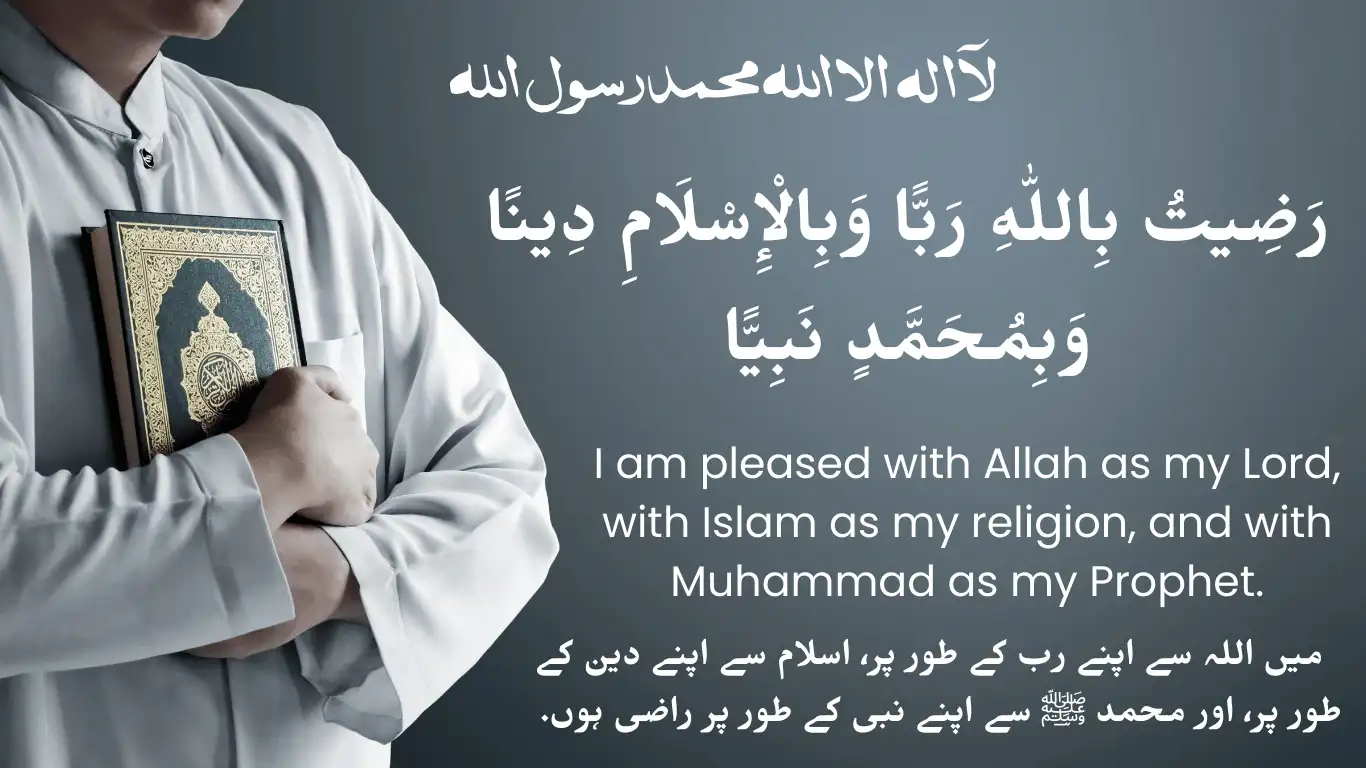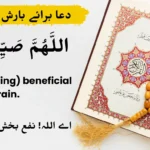The beautiful supplication radhitu billahi rabba wabil islami dina wabi muhammadin nabiyya is a concise yet profound testament of a Muslim’s faith. This phrase signifies contentment with Allah as the Lord, Islam as the religion, and Prophet Muhammad (PBUH) as the Messenger. In this article, we will explore its meaning, significance, and provide the full Arabic text with English and Urdu translations.
| Dua for Health & Healing- اَللّٰهُمَّ عَافِنِي فِي بَدَنِي |
| A Powerful Dua Rabbi Adkhilni Mudkhala Sidqin |
| Astaghfar Dua: Meaning, Benefits & How to Recite |
| dua ahad- دعاء العهد |
Understanding the Phrase- radhitu billahi rabba wabil islami dina wabi muhammadin nabiyya
Arabic Text
رَضِيتُ بِاللّٰهِ رَبًّا وَبِالْإِسْلَامِ دِينًا وَبِمُحَمَّدٍ نَبِيًّا
English Translation
“I am pleased with Allah as my Lord, with Islam as my religion, and with Muhammad as my Prophet.”
Urdu Translation
“میں اللہ سے اپنے رب کے طور پر، اسلام سے اپنے دین کے طور پر، اور محمد ﷺ سے اپنے نبی کے طور پر راضی ہوں۔”
This supplication reflects the essence of Islamic faith, where a believer submits wholeheartedly to Allah, embraces Islam as the ultimate way of life, and acknowledges the guidance of Prophet Muhammad (PBUH).
Breaking Down the Phrase
1. Radhitu Billahi Rabba (رَضِيتُ بِاللّٰهِ رَبًّا)
Translation:
“I am pleased with Allah as my Lord.”
This part emphasizes acceptance and contentment with Allah’s lordship. It reminds Muslims of the attributes of Allah, including His mercy, justice, and omnipotence. It fosters reliance on Allah in every aspect of life.
Significance in Daily Life:
When a believer recites this, they affirm that they trust Allah’s plans and are grateful for His blessings. It is a source of spiritual comfort and resilience.
2. Wabil Islami Dina (وَبِالْإِسْلَامِ دِينًا)
Translation:
“And with Islam as my religion.”
This portion highlights the acceptance of Islam as the true path to success in this life and the Hereafter. Islam provides a comprehensive framework for living, from acts of worship to ethical conduct and social responsibilities.
Impact on the Believer:
Reciting this strengthens one’s commitment to following the Quran and Sunnah. It also serves as a reminder to embody the principles of Islam, such as compassion, honesty, and justice.
3. Wabi Muhammadin Nabiyya (وَبِمُحَمَّدٍ نَبِيًّا)
Translation:
“And with Muhammad as my Prophet.”
This segment acknowledges Prophet Muhammad (PBUH) as the final messenger of Allah, whose life serves as a perfect model for humanity. Believers are encouraged to emulate his character and follow his teachings in all aspects of life.
Relevance Today:
Reciting this is an act of love and respect for the Prophet (PBUH). It inspires believers to learn about his Sunnah and implement it, fostering a stronger connection to their faith.
Benefits of Reciting This Supplication
- Strengthens Faith: It reaffirms belief in Allah, Islam, and the Prophet (PBUH).
- Brings Inner Peace: Acknowledging Allah’s lordship provides comfort and eliminates anxiety.
- Encourages Gratitude: It reminds the believer to be thankful for the guidance of Islam and the example of the Prophet (PBUH).
- Enhances Spiritual Connection: Regular recitation deepens the bond with Allah and reinforces one’s identity as a Muslim.
When to Recite This Supplication
This dua can be recited at any time but is especially beneficial:
- During moments of reflection and gratitude.
- After completing daily prayers.
- When seeking to renew one’s commitment to faith.
- At times of distress or uncertainty, as it fosters reliance on Allah.
FAQs
The phrase means, “I am pleased with Allah as my Lord, with Islam as my religion, and with Muhammad as my Prophet.” It is a powerful declaration of faith in Islam.
This supplication is important because it affirms a Muslim’s belief in Allah, the religion of Islam, and the prophethood of Muhammad (PBUH). It strengthens faith and brings spiritual comfort.
There is no fixed rule, but it can be recited daily, particularly after prayers or during moments of reflection, to renew and strengthen faith.
Conclusion
The supplication “radhitu billahi rabba wabil islami dina wabi muhammadin nabiyya” is a cornerstone of a Muslim’s faith. By regularly reciting and reflecting on its meaning, believers can cultivate a deeper spiritual connection, gratitude, and peace of mind. Incorporate this beautiful dua into your daily life to experience its transformative power.




